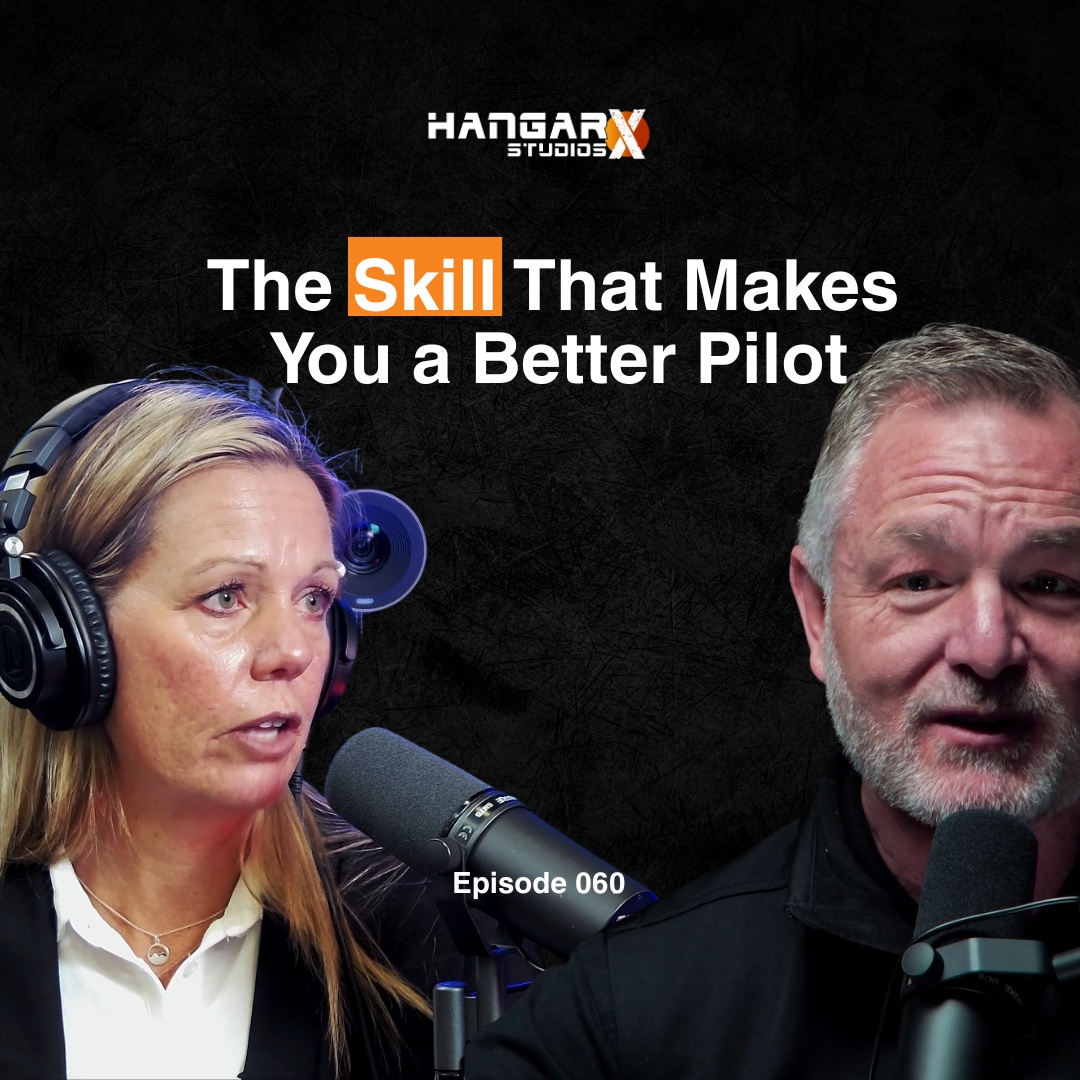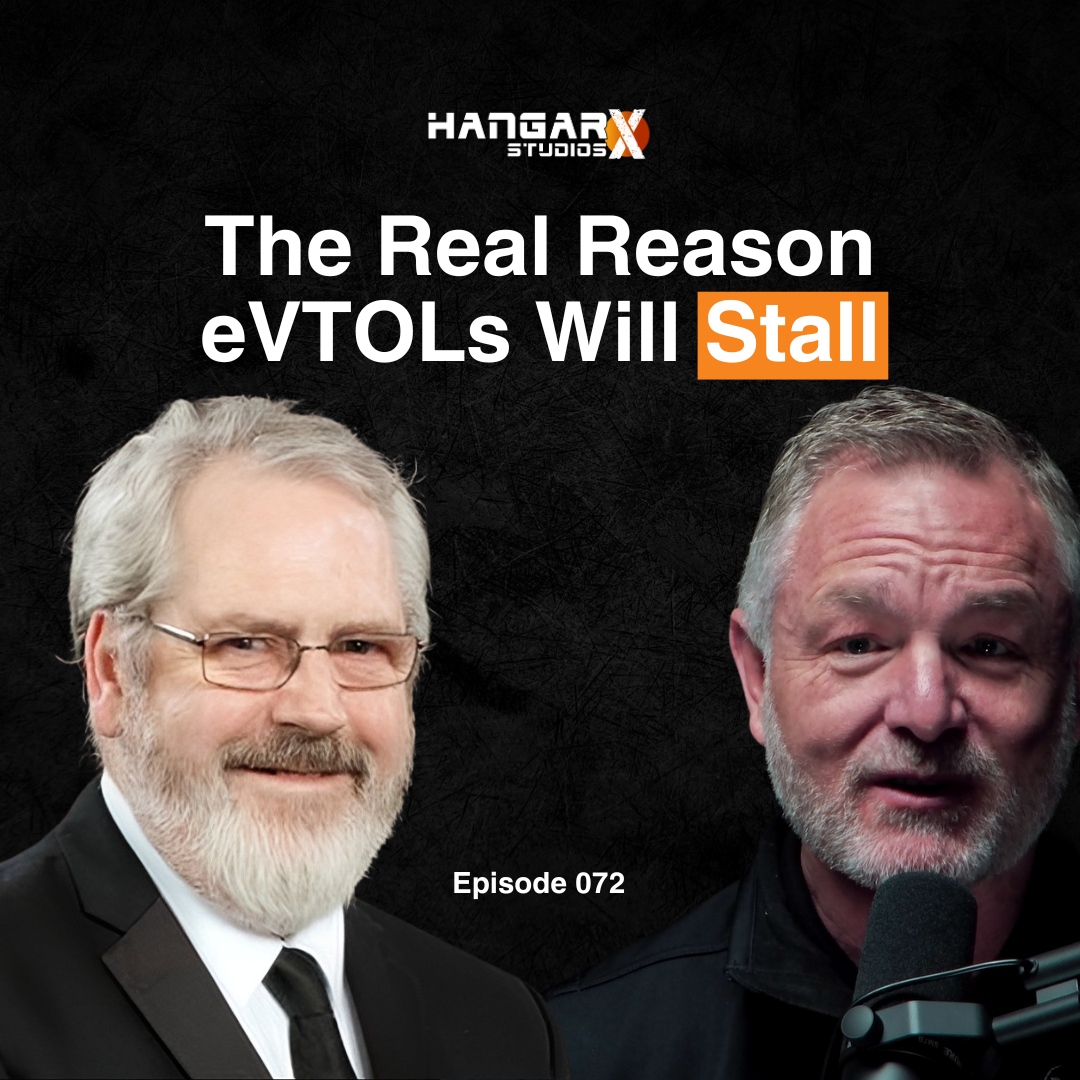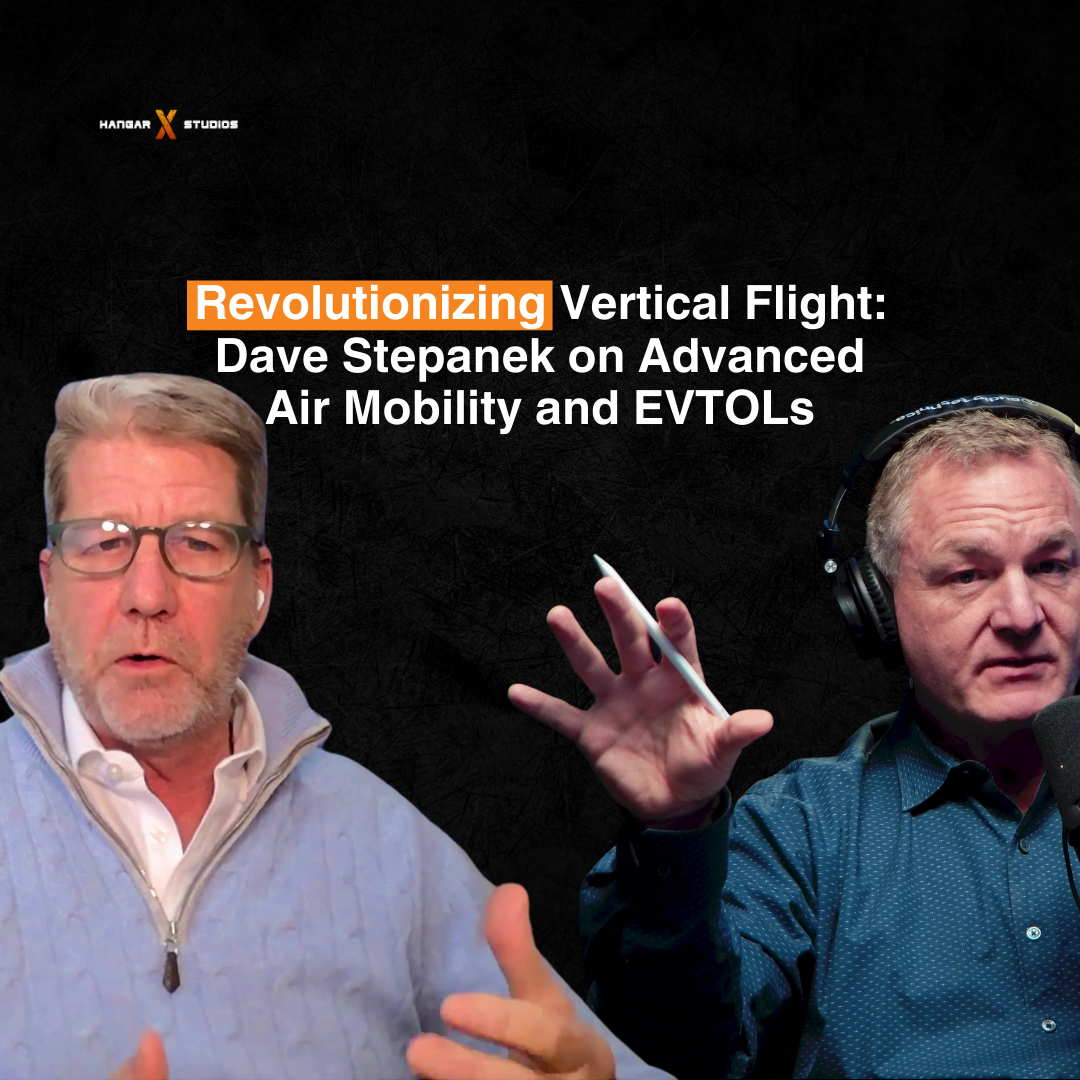Episode Transcript
[00:00:00] Speaker A: Well, in this accident, I was on a horse and at a full gallop, he bucked me off head first into a steel fence. So I basically broke every bone from my chest up. Was in the hospital for two years, but my left eye is completely blind. So it took me 10 years of working with FAA to get my medical back.
[00:00:14] Speaker B: Welcome to Hangar X Studios, where former fighter pilot and host John Ramstead takes us on a journey across aerospace as it enters an historic period of innovation and transformation.
Our guests include aviation experts, pilots, financiers, military leaders, and innovators of all types.
Buckle up for another episode of Hangar X.
[00:00:44] Speaker C: Hi, I'm Tobin Arthur, the Chief Strategy Officer for XTI Aerospace. And today I have a special privilege. I'm on set of HangarX Studios with my good friend John Ramstead. John, welcome to the show.
[00:00:56] Speaker A: Great to be here, Tobin.
[00:00:57] Speaker C: So this is a little unusual because for those of you who had followed this show since it's launched, John is the host of this show. But today we've turned the tables. While XTI is producing and sponsoring the show, John is the host of the show, but we wanted everybody to get to know John a little bit. So we've turned the tables. I'm going to be firing questions to John. He's got a super interesting background, and I'm looking forward to dive in. So, John, let's start with the fact that you have a flight background. You're a pilot. Why don't you go back a little bit to the beginnings of your career as a pilot?
[00:01:31] Speaker A: Oh, the beginnings of my career was I wanted to be a fighter pilot. Back in middle school, I read everything about World War II. I was fascinated with two things. Submarine warfare, because I think the engineering. I ended up getting an electrical engineering degree. But also aviation always, I think, just appealed to me intellectually and also the adventure. So I was in college on a Navy ROTC scholarship, and I graduated college in 1988. And Top Gun, a little movie you might have heard of, came out in 1986.
[00:02:00] Speaker C: Nice.
[00:02:01] Speaker A: So I'm sitting there watching the movie Top Gun, and I'm in Navy rotc, and I go back and I wanted to apply to aviation, and that's where it all started.
[00:02:10] Speaker C: Awesome. So did you end up down in Miramar at the whole top gang process, or how does that work?
[00:02:17] Speaker A: Well, you know, I got orders. Finally, I got orders to go to flight school, which is in Pensacola, Florida. And I'll never forget driving in August that summer. And there's this giant water tower as you drive into Pensacola, and Everybody who's been there before, who's been a pilot, knows exactly what it says on that. But it says the cradle of naval aviation.
[00:02:37] Speaker C: Nice.
[00:02:37] Speaker A: With a big pair of gold wings on there. And I got to tell you, though, I'll never forget, when our class officer, I was in college at Rensselaer Polytechnic in upstate New York, he said, listen, guys, I just want you to know, you're going to flight school. You're all excited, but that movie has made this so popular.
Only one out of every 10,000 people that are applying to get into the flight program, for all these different programs we have, is going to get to fly a fighter.
[00:03:03] Speaker C: Wow.
[00:03:03] Speaker A: I didn't know if that was true or not, but all of a sudden, man, I was crushed because I'm like, I am not a 1 in 10,000.
[00:03:09] Speaker C: That's not good math.
[00:03:11] Speaker A: It's not good math for me. I'm not that guy. Like, oh, my goodness. So I'm kind of freaking out. And I called my dad. He actually gave me some of the best advice I've ever had in my life. And I followed it ever since. He was just very calm. He was one of my closest friends. He's very calm. He goes, well, here's what you do, John. When you get down there, go find there's going to be a student that everybody's talking about. He's crushing the program. He's going to be a couple classes ahead of you, so you're not competing for anything. And go buy him a beer and ask him, hey, what are you doing differently? And could you share it with me? Well, that guy's name was John Foster, and I found him. Everybody on base was talking about him. Nobody could figure out how he was doing, what he was doing. But you know what he said to me is, nobody's asked me yet. He goes, you're the first person that asked me. And he shared me. Everything he's doing, it was totally counterintuitive. I would have literally, honestly never thought of how he was preparing and thinking, really myself. And he mentored me, and I followed him, and he graduated number one in his class. And because he was my mentor and kind of also held me accountable to putting in this extra work, I was able to graduate number one in my class and be able to not only go into the jet pipeline, So I went up to Meridian, Mississippi, to fly T2 Buckeyes, if anyone knows what that ugly airplane looks like. But we could do inverted spins in this Navy jet trainer. It was awesome.
[00:04:28] Speaker C: That's awesome.
[00:04:29] Speaker A: And then I flew the A4 Skyhawk for advanced jet training. Then I got my gold wings in Mississippi. And then I went to. Then I was able to select to fly the F14 Tomcat. And I went to Virginia beach for F14 training. And then as soon as I got my wings, I was sent out to a carrier that was heading to the Persian Gulf for Operation Desert Storm.
[00:04:48] Speaker C: Wow, that's incredible. Talk just a little bit. Cause I'm curious, you know, hearing about the training program, how long does that last, start to finish?
[00:04:55] Speaker A: Start to finish for me was just under two years.
[00:04:59] Speaker C: Okay.
[00:04:59] Speaker A: Yep.
[00:05:00] Speaker C: And how many people started in a class?
[00:05:02] Speaker A: Oh, in kind of the AOCs, if anybody remembers. Officer and a Gentleman.
[00:05:07] Speaker C: Yep.
[00:05:07] Speaker A: I think we had about half of the people finish that, which is all physical and academic and deep water survival.
[00:05:14] Speaker C: Okay.
[00:05:14] Speaker A: And then my class, I remember in my. There was three squadrons up in Whiting Field. There was 40 graduates my month, and only two of us had the grades to even apply for jets.
[00:05:29] Speaker C: Unbelievable.
[00:05:30] Speaker A: So think about that. So there's a 50% attrition before you even got there.
[00:05:33] Speaker C: Right.
[00:05:34] Speaker A: And then of the people that were there, two out of 40 of us, so one out of 20 got even had the chance to apply. Now let's. If you're above what we call this jet cutoff, they actually figured out the way they grade everything. There's a. Think of it like a cum. There's a cutoff because they found that below this line, people are unsafe around an aircraft carrier. Interesting. Now, let's say there's five people above the cutoff, but they have one jet seat or zero sometimes. There's no guarantee.
[00:06:00] Speaker C: Wow.
[00:06:01] Speaker A: So me and this other guy actually, that time, got that. And then we went up to Meridian, and of that first class, I would say a third of the guys did not qualify at the landing on the aircraft carrier. It's kind of the great equalizer in the T2. And then we go to the A4 and we had more attrition there. So, you know, the 10,000 to 1 number. Now that I actually think about all these filtering mechanisms all the way down to flying a fighter versus all the other things, transports and helicopters, is honestly probably fairly accurate.
[00:06:34] Speaker C: That's amazing. So you've had a pretty incredible career because that's where you started.
[00:06:38] Speaker A: Yep.
[00:06:39] Speaker C: But you're also an author.
[00:06:41] Speaker A: Yep.
[00:06:42] Speaker C: You're a podcaster. You've got, however, what, more than 400 episodes of your own podcast.
[00:06:46] Speaker A: I do. Yep.
[00:06:47] Speaker C: Incredible. Tell us about that podcast. What's the name of that?
[00:06:49] Speaker A: It's called Eternal Leadership. And I launched that after I spent two years in the hospital after what should have been a fatal accident. And it was just about, hey, faith became very important in this recovery for me and to find purpose and meaning and why am I even here? And so it's exploring how do we do good in the world through doing good business, if that makes sense. And so I've met some of the most incredible people from all over the world doing that podcast. It's the top 1% of all podcasts in itunes now.
[00:07:19] Speaker C: It's an incredible show. The book's incredible. And we'll put the.
[00:07:22] Speaker A: And the book is on purpose, with purpose to put in a shameless plug.
[00:07:25] Speaker C: No, it's not shameless at all. It's worthwhile read. We'll put the. The links in our show notes. And if I remember correctly, did you not fly up to that conference where you ended up having your wrecks? I think you told me a story about your partner had to go ultimately go fetch the plane.
[00:07:40] Speaker A: I did.
[00:07:40] Speaker C: Is that accurate?
[00:07:41] Speaker A: Yeah. I gotta tell you, it was my. I had two partners in the plane. Amazing, guys. It was an SR22 twin turbo. It was a G3.
[00:07:49] Speaker C: Okay.
[00:07:50] Speaker A: And I flew from Denver up to Great Falls and I had this accident. I was in ICU and my wife had the presence of mind to call him because he went up to get the airplane. But I was obligated to a share of this airplane. But he realized how severe this accident was. So he and the other partner actually on their own, released me from any financial obligations which actually turned out to be really good because I spent the next two years on a hospital bed and had no income and had lots of medical bills. But some of the people that came around me, even people I didn't know during that period of time, it was really humbling.
I'm so incredibly grateful. But I also just saw what being the beneficiary of others generosity sometimes is hard. Especially when you used to be the person who used to kind of write the checks was really transformational for me.
[00:08:44] Speaker C: And more recently, we had the privilege, my two boys and I, of joining you as you were getting recertified in the SR series, the Cirrus series. Tell us about that. Now you're back to flying the Cirrus.
[00:08:56] Speaker A: Well, in this accident, I was on a horse and a full gallop. He bucked me off headfirst into a steel fence. So I basically broke every bone from my chest up. Was in the hospital for two years, but my left eye is completely blind. So it took me 10 years of working with FAA to get my medical back. So, yes, I decided to get. I want to get recertified in SR22, which is an amazing airplane to fly. And I just finished my certification. You came over with your boys and actually, I think it was my last flight with the instructor to finish my whole checkout with the whole Cirrus program. And it was really fun meeting your boys and doing the whole pre flight with them and showing them all the different things about the airplane. They were fascinating. You know what? We need to take the boys up flying four of us. It'd be a great flight.
[00:09:37] Speaker C: Yeah, they're hooked now. You know, it's like a lot of us, you know, as kids, we get fascinated by rockets and airplanes and, you know, that never really leaves you. Speaking of which, you know, just this week, Elon Musk, they launch an. Or they. They land another incredible.
[00:09:53] Speaker A: I've probably watched that video a dozen times because I'm in awe.
[00:09:56] Speaker C: We've got to put footage of that up for this episode because it was incredible. Hats off to to SpaceX, but it just sort of speaks to this fascination we all have. We're pushing the envelope. Elon Musk is doing incredible things with that program and Jeff Bezos with his program, but, you know, let's just kind of get to XTI then bring this all full circle. And so now you've joined us as a senior advisor to the company, but hosting this podcast, talked a little bit about some of the fun that you anticipate as you're bringing on guests and you know, what kinds of things we can we anticipate from the show over.
[00:10:29] Speaker A: The coming year, you know, the future of aviation. Right now, I think we're at this profound inflection point in history. There's been so much advancements in software, flight controls, I think materials used in wings, you know, power plants and engines. But there has not been a meaningful new aircraft type for commercialization for the civilian use.
It's all been in the military. We think of the F35B.
One of my friend's son just got orders to go fly that. I mentored him in flight school. You know, the Harrier, the Osprey, and so forth. And I've flown helicopters in the military and fighters. But now we're looking at combining the two of those for civilian use. And I really think that this idea, this concept where XTI sits, the TRI Fan 600 sits, is absolutely going to be transformational, not only to aerospace, but to how we live, how we serve. People, how we do business, how we help people that are in need, how we get goods to people globally in both good times and also, you know, disaster times.
[00:11:41] Speaker C: Right.
[00:11:41] Speaker A: And I really. It's fun to be at a place where you're. You know what? I want to look back and go, you know what? I was with that team when.
[00:11:48] Speaker C: Yeah.
[00:11:49] Speaker A: You know, because, you know, I can see myself 20 years from now when I'm, you know, a lot more gray hair going, hey, I was part of being in a team that actually changed and made the world better for what we did, more sustainable and more connected.
[00:12:03] Speaker C: Well, and you and I have both been involved in things in our careers that were iterative, and there's a place for iterative. Most things are iterative in the world, but there are once in a while these things that are transformative. And I think that's what's lured you and I and the rest of the team to working on xtis, because this really is an inflection point in aviation, this aircraft. And we're lucky here on the studio set to have the star of the show here with us. It's here at every podcast. And also a hat tip to Martin Butler, who is the director and creator of the show. We won't see him as much on camera, but every once in a while there'll probably be a little cameo. He's here on set with us, but Martin has put this together and brought this hanger to life. Unbelievable. It's really unbelievable. We're. It's world class having a cinematographer of this caliber working on this. So, John, I'm really excited to have you hosting this. It's going to be super fun to hear the shows and the guests that you've got on, and welcome to the program and look forward to seeing what's coming.
[00:13:01] Speaker A: Well, thank you. And, you know, what's coming is we're already reaching out and we have some of the leading minds, I believe, in this industry, on innovation, on use, on financing, on every aspect, I think, of innovation, creativity, and where this is going. So I believe that what we're going to be putting out is going to not just advance, I think, this vision of a new aviation, you know, space. It's going to bring people in and create a community and a movement around it.
[00:13:33] Speaker C: Love it. Thanks, John.
[00:13:35] Speaker A: My pleasure. Thanks, Tobin.


